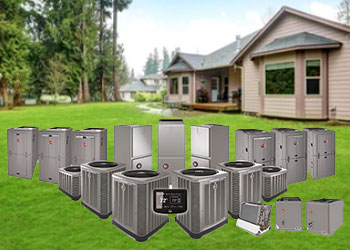 Choosing the right HVAC (Heating, Ventilation, and Air Conditioning) system for your home is a significant decision that impacts your comfort, energy efficiency, and overall indoor air quality. Here’s a step-by-step guide to help you make an informed decision:
Choosing the right HVAC (Heating, Ventilation, and Air Conditioning) system for your home is a significant decision that impacts your comfort, energy efficiency, and overall indoor air quality. Here’s a step-by-step guide to help you make an informed decision:
- Assess Your Needs:
-
- Determine the climate of your region: The heating and cooling needs vary based on your location’s climate.
- Consider the size of your home: The square footage of your home plays a crucial role in selecting the right-sized system.
- Research HVAC Types:
-
- Central HVAC Systems: These are common and consist of a central heating unit (furnace) and a central cooling unit (air conditioner) that distribute air through ducts.
- Ductless Mini-Split Systems: These are ideal for homes without ducts or for specific zones within the house.
- Heat Pumps: They provide both heating and cooling by transferring heat between the indoors and outdoors.
- Energy Efficiency:
-
- Look for systems with high SEER (Seasonal Energy Efficiency Ratio) and HSPF (Heating Seasonal Performance Factor) ratings for cooling and heating, respectively.
- Energy Star certified systems are more efficient and can save you money on energy bills.
- Consider Zoning:
-
- Zoned systems allow you to control the temperature of different areas independently, optimizing comfort and energy usage.
- Check for Rebates and Incentives:
-
- Many governments and utility companies offer rebates and incentives for installing energy-efficient HVAC systems.
- Calculate Load and Sizing:
-
- It’s crucial to properly size your HVAC system. An oversized system will cycle on and off frequently, leading to inefficiencies and discomfort.
- A professional HVAC contractor can perform a load calculation to determine the right size for your home.
- Choose a Reputable Contractor:
-
- Research and choose a licensed and experienced HVAC contractor who can properly assess your needs, offer recommendations, and install the system correctly.
- Consider Indoor Air Quality (IAQ):
-
- Some HVAC systems offer features like air purification, humidity control, and ventilation that contribute to better indoor air quality.
- Long-Term Costs:
-
- While initial costs are important, consider the long-term operational and maintenance costs of the system.
- Warranty and Maintenance:
-
- Check the manufacturer’s warranty and inquire about maintenance requirements. Regular maintenance is essential for keeping your system efficient and extending its lifespan.
- Ask for Recommendations:
-
- Seek recommendations from friends, family, or online reviews to gather insights on different HVAC brands and models.
- Future Expansion:
-
- If you plan to expand your home, consider a system that can accommodate potential additions.
- Compare Quotes From Reputable Companies:
-
- Get multiple quotes from different contractors to ensure you’re getting a fair price and a system that meets your needs.
- Review Contracts Thoroughly:
-
- Before finalizing, review the contract carefully to understand the installation process, warranties, costs, and any other details.
- Environmental Impact:
-
- If sustainability is important to you, consider systems that use eco-friendly refrigerants and have minimal environmental impact.
Remember that HVAC systems are a long-term investment, so take the time to make an informed decision that aligns with your comfort preferences, budget, and energy efficiency goals. It’s recommended to work closely with a qualified HVAC professional throughout the process.
